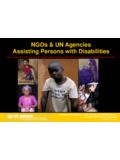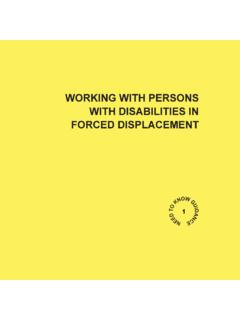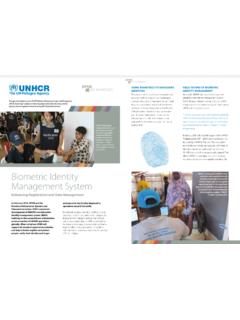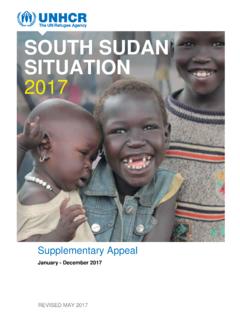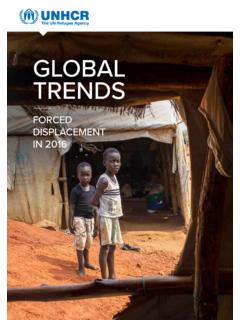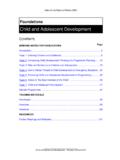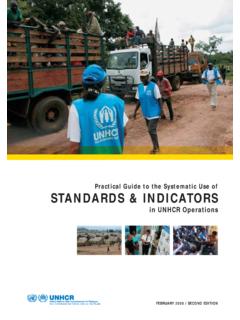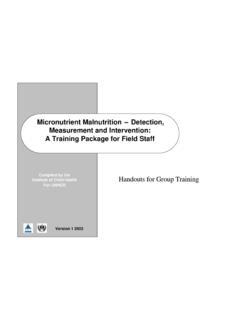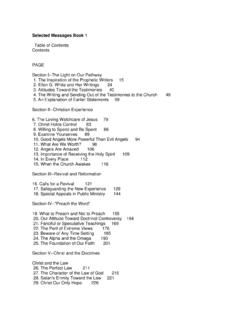Transcription of SUBMISSION BY THE - UNHCR
1 SUBMISSION BY THE OFFICE OF THE UNITED NATIONS HIGH COMMISSIONER FOR REFUGEESON THEINQUIRY INTO THE SERIOUS ALLEGATIONS OF ABUSE, SELF-HARM AND NEGLECT OF ASYLUM-SEEKERS IN RELATION TO THE NAURU REGIONAL PROCESSING CENTRE, AND ANY LIKEALLEGATIONS IN RELATION TO THE MANUS REGIONAL PROCESSING CENTRE REFERRED TOTHE SENATE LEGAL AND CONSTITUTIONAL AFFAIRS COMMITTEE Table of Contents s Standing to obligations of the Commonwealth Government and contractors relating to thetreatment of asylum-seekers and factors that have contributed to the abuse and self-harm alleged to have occurred,as well as the provision of support services for asylum-seekers who have been alleged orhave been found to have been subject to abuse, neglect or of open-ended mandatory detention and inadequate legal and physicalconditions of detention and concerns relating to open-ended mandatory detention and inadequateconditions and to detention policy at Lombrum Regional Processing Centre on Manus Island,Papua New Guinea.
2 And ongoing to detention policy at the Regional Processing Centres on Nauru and mental health deterioration of transferred asylum-seekers and health concerns in Papua New health concerns in of viable long-term of integration opportunities or viable long-term solutions in Papua New of viable long-term solutions in of adequate protection for asylum-seekers and refugees with specific of protection for people with specific needs in Papua New of protection for persons with specific needs on 1 EXECUTIVE SUMMARY UNHCR s position on transfer arrangements in relation to asylum-seekers and for thepurposes of asylum processing is well established. Asylum-seekers should ordinarily havetheir claims processed and benefit from protection in the territory of the State where theyarrive or which otherwise has jurisdiction over them.
3 UNHCR s view is that the globalrefugee system is undermined when States deny access to territory for certain categories ofasylum-seekers and refugees. Australia s transfer of asylum-seekers to Nauru and Papua New Guinea for processing, andthe denial of settlement in Australia for those found to be in need of international protection,does not extinguish the legal responsibility of Australia for the protection of the transferredasylum-seekers and refugees. This includes ensuring proper protection for asylum-seekersand refugees regardless of their mode of arrival. UNHCR has found in both Papua New Guinea and Nauru that the punitive conditions ofopen-ended mandatory detention in a highly securitized environment and the lack of anyviable long-term solution for transferred individuals has exposed asylum-seekers tocircumstances causing harm, notably related to mental health, as well as different forms ofalleged abuse.
4 It is evident that the guarantees, protections and rights owed to transferredasylum-seekers and refugees, have not been fully met by either the Government ofAustralia, nor the Governments of Papua New Guinea and Nauru (as relevant), and thetransfer arrangements do not adequately comply with international laws and standards. UNHCR finds that long-term, viable solutions are not available in Nauru or Papua NewGuinea, even on a temporary basis. Overall, the lack of any viable long-term solutionsnecessitates urgent action to remove all transferred asylum-seekers and refugees from PapuaNew Guinea and Nauru to a safe country that provides humane conditions in line withinternational standards. Australia, together with Papua New Guinea and Nauru (asrelevant), share responsibility to ensure that the rights of the concerned individuals are fullyupheld, and that solutions are found for them in line with international law and Statepractices, as well as accepted standards of Office of the United Nations High Commissioner for Refugees ( UNHCR ) welcomes theopportunity to provide a SUBMISSION to the Senate Legal and Constitutional Affairs Committee(the Committee ) on its Inquiry into the serious allegations of abuse, self-harm and neglect ofasylum-seekers in relation to the Nauru Regional Processing Centre, and any like allegationsin relation to the Manus Regional Processing Centre (the Inquiry ).
5 S STANDING TO is a party to the 1951 Convention relating to the Status of Refugees and its 1967 Protocol relating to the Status of Refugees (together, the 1951 Refugee Convention ). makes this SUBMISSION pursuant to its supervisory role with respect to the 1951 Refugee Convention and in particular Article 35 thereof, and its mandate under the 1950 Statute of the Office of the United Nations High Commissioner for s SUBMISSION addresses the following terms of reference of the Inquiry:a)The obligations of the Commonwealth Government and contractors relating to the treatmentof asylum-seekers and refugees, including the provision of support, capability and capacitybuilding to local Nauruan authorities (section III below).b) The factors that have contributed to the abuse and self-harm alleged to have occurred(section IV below).
6 C)The provision of support services for asylum-seekers and refugees who have been alleged orhave been found to have been subject to abuse, neglect or self-harm in the Lombrum Regional Processing Centre , East Lorengau Refugee Transit Centre and RegionalProcessing Centres on Nauru or within the Nauruan community (section IV below).1 The term 1951 Refugee Convention is used to refer to the Convention relating to the Status of Refugees, opened for signature 28 July 1951, ATS 5 (entered into force for Australia 22 April 1954) as applied in accordance with the Protocol Relating to the Status of Refugees, opened for signature on 31 January 1967, ATS 37 (entered into force for Australia on 13 December 1973). 2 UN General Assembly, Resolution 428 (V), Statute of the Office of the United Nations High Commissioner for Refugees (1950), Annex.
7 3 5. In making this SUBMISSION , UNHCR draws on the findings of its seven monitoring visits to the Republic of Nauru (Nauru) and eight visits to Manus Island, Papua New Guinea, since 2012, and the recommendations that have been shared with the Governments of Australia, Nauru and Papua New Guinea following those missions. III. THE OBLIGATIONS OF THE COMMONWEALTH GOVERNMENT AND CONTRACTORS RELATING TO THE TREATMENT OF ASYLUM-SEEKERS AND REFUGEES 6. UNHCR s general position, as stated in previous submissions, is that asylum-seekers and refugees should be processed in the territory of the State where they arrive, or which otherwise has jurisdiction over them (in this case, Australia).3 7. UNHCR acknowledges the complex challenges of mixed migration maritime movements faced by States in the region.
8 In particular, UNHCR has long advocated for stronger regional and international cooperation to address mixed migration maritime movements in a way that respects the legitimate concerns of States, but also the individual protection and humanitarian needs of those who resort to dangerous travel, including by sea. 8. Any cooperation arrangements between States should be based on responsibility sharing for refugee protection in accordance with international law, not responsibility shifting, in order to enhance protection in all concerned States and in the region as a whole. 9. The legality and appropriateness of any transfer arrangement needs to be assessed on a case-by-case basis, subject to its particular modalities and legal provisions. Any transfer arrangement needs to guarantee that each asylum-seeker is: a) individually assessed as to the appropriateness of the transfer, subject to procedural safeguards, prior to transfer.
9 Such safeguards include an opportunity to rebut the presumption of safety in the individual s particular circumstances. Pre-transfer assessments are particularly important for vulnerable people, including unaccompanied and separated children whose best interest must be a primary consideration; b) admitted to the proposed receiving State; c) protected against refoulement; 3 UN High Commissioner for Refugees ( UNHCR ), Guidance Note on bilateral and/or multilateral transfer arrangements of asylum-seekers, May 2013, < > ( UNHCR Guidance Note ). 4 d) given access to fair and efficient procedures for the determination of refugee status and/or other forms of international protection; e) treated in accordance with accepted international standards (for example, appropriate reception arrangements; access to health, education and other basic services; safeguards against arbitrary detention; non-detention of children; use of detention for adults only as a last resort, where legal grounds are shown, and subject to judicial control; use of alternatives to detention wherever possible; and identification and provision of assistance to persons with specific needs).
10 And f) if recognized as a refugee, able to enjoy asylum and timely access to a durable solution that includes the following guarantees: i) protection from refoulement, in any manner whatsoever; and otherwise enjoy the rights under the 1951 Refugee Convention and other international laws and standards in full and without discrimination, in law and in practice. In particular, the arrangement would provide for lawful stay, access to employment and/or self-employment opportunities, education for children, freedom of movement including the right to choose one s place of residence, and the right to travel outside the territory; ii) an adequately resourced local integration programme is in place which provides the services and support needed by refugees to adjust to a new society; iii) the possibility for family reunification in order to ensure the unity of the refugee s family is maintained; and iv) the capacity of the receiving State and the commitment of the local community are able to sustain such an arrangement.

